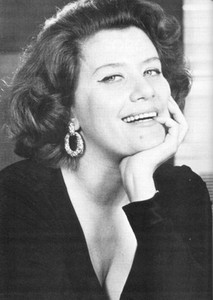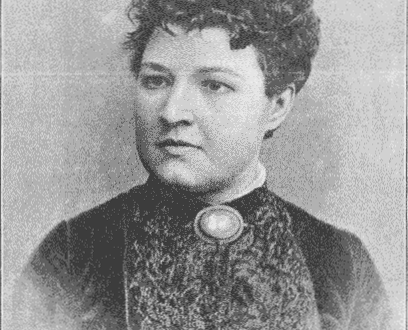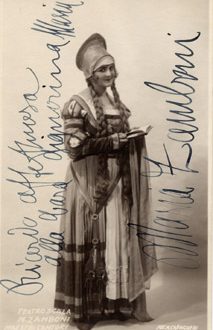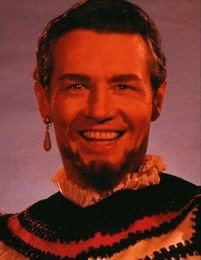
Elena Obraztsova |
Elena Obraztsova

M.V. Peskova describes Obraztsova in her article: “The great singer of our time, whose work has become an outstanding phenomenon in world musical life. He has an impeccable musical culture, brilliant vocal technique. Her rich mezzo-soprano filled with sensual colors, intonational expressiveness, subtle psychologism and unconditional dramatic talent made the whole world talk about her embodiment of the parts of Santuzza (Country Honor), Carmen, Delilah, Marfa (Khovanshchina).
After her performance in “Boris Godunov” on tour of the Bolshoi Theater in Paris, the famous impresario Sol Yurok, who worked with F.I. Chaliapin, called her an extra-class singer. Foreign criticism classifies her as one of the “great voices of the Bolshoi”. In 1980, the singer was awarded the Golden Verdi award from the Italian city of Busseto for an outstanding performance of the music of the great composer.
Elena Vasilievna Obraztsova was born on July 7, 1939 in Leningrad. His father, an engineer by profession, had an excellent baritone voice, besides, he played the violin well. Music often sounded in the Obraztsovs’ apartment. Lena began to sing early, in kindergarten. Then she became a soloist of the choir of the Palace of Pioneers and Schoolchildren. There, the girl with pleasure performed gypsy romances and songs extremely popular in those years from the repertoire of Lolita Torres. At first, she was distinguished by a light, mobile coloratura soprano, which eventually transformed into a contralto.
After graduating from school in Taganrog, where her father worked at that time, Lena, at the insistence of her parents, entered the Rostov Electrotechnical Institute. But, after studying for a year, the girl goes at her own risk to Leningrad, to enter the conservatory and achieves her goal.
Classes began with Professor Antonina Andreevna Grigorieva. “She is very tactful, accurate as a person and as a musician,” says Obraztsova. – I wanted to do everything quickly, to sing big arias at once, complex romances. And she persistently convinced that nothing would come of it without comprehending the “basics” of vocals … And I sang exercises after exercises, and only sometimes – small romances. Then it was time for the bigger things. Antonina Andreevna never instructed, did not instruct, but always tried to ensure that I myself expressed my attitude to the work being performed. I rejoiced at my first victories in Helsinki and at the Glinka competition no less than myself … ”.
In 1962, in Helsinki, Elena received her first award, a gold medal and the title of laureate, and in the same year she won in Moscow at the II All-Union Vocal Competition named after M.I. Glinka. The soloist of the Bolshoi Theater P.G. Lisitsian and head of the opera troupe T.L. Chernyakov, who invited Obraztsova to audition in the theater.
So in December 1963, while still a student, Obraztsova made her debut on the stage of the Bolshoi Theater in the role of Marina Mnishek (Boris Godunov). The singer recalls this event with particular emotion: “I went on the stage of the Bolshoi Theater without a single orchestral rehearsal. I remember how I stood backstage and said to myself: “Boris Godunov can go on without a stage by the fountain, and I won’t go out for anything, let the curtain close, I won’t go out.” I was in a completely faint state, and if it weren’t for the gentlemen who led me to the stage by the arms, maybe there really wouldn’t have been a scene at the fountain that evening. I have no impressions of my first performance – only one excitement, some kind of ramp fireball, and the rest was all in a swoon. But subconsciously I felt that I was singing correctly. The audience received me very well … “
Later, Parisian reviewers wrote about Obraztsova in the role of Marina Mnishek: “The audience … enthusiastically greeted Elena Obraztsova, who has excellent vocal and external data for an ideal Marina. Obraztsova is a delightful actress, whose voice, style, stage presence and beauty are admired by the audience … “
Having brilliantly graduated from the Leningrad Conservatory in 1964, Obraztsova immediately became a soloist of the Bolshoi Theater. Soon she flies to Japan with a team of artists, and then performs in Italy with the troupe of the Bolshoi Theater. On the stage of La Scala, the young artist performs the parts of the Governess (Tchaikovsky’s The Queen of Spades) and Princess Marya (Prokofiev’s War and Peace).
M. Zhirmunsky writes:
“There are still legends about her triumph on the stage of La Scala, although this event is already 20 years old. Her first performance at the Metropolitan Opera was called “the most grandiose debut in the history of the theater” by the duration of the standing ovation. At the same time, Obraztsova got into the group of Karayan singers, reaching the highest possible recognition of professional qualities. During the three days of recording Il trovatore, she captivated the great conductor with her unthinkable openness of temperament, her ability to extract the maximum emotional impact from music, as well as a huge amount of beautiful clothes received from American friends especially for a meeting with the maestro. She changed clothes three times a day, received roses from him, invitations to sing in Salzburg and record five operas. But nervous exhaustion after success at La Scala prevented him from going to see Karajan for a performance – he did not receive a notification from the responsible Soviet organization, he was offended by Obraztsova and all Russians.
She considers the collapse of these plans the main blow to her own career. From the truce that followed two years later, the only performance left was Don Carlos and memories of the shock of his phone call, his personal plane littered with Playboys, and Karajan’s hit on the head with a score at the entrance to the theater. By that time, Agnes Baltsa, the owner of one of those colorless voices that could not distract the listener from the perception of the latest ideas of the Master, had already become Karajan’s permanent mezzo-soprano.
In 1970, Obraztsova received the highest awards at two major international competitions: named after P.I. Tchaikovsky in Moscow and the name of the famous Spanish singer Francisco Viñas in Barcelona.
But Obraztsova did not stop growing. Her repertoire is expanding significantly. She performs such diverse roles as Frosya in Prokofiev’s opera Semyon Kotko, Azucena in Il trovatore, Carmen, Eboli in Don Carlos, Zhenya Komelkova in Molchanov’s opera The Dawns Here Are Quiet.
She performed with the Bolshoi Theater Company in Tokyo and Osaka (1970), Budapest and Vienna (1971), Milan (1973), New York and Washington (1975). And everywhere criticism invariably notes the high skill of the Soviet singer. One of the reviewers after the performances of the artist in New York wrote: “Elena Obraztsova is on the verge of international recognition. We can only dream of such a singer. She has everything that distinguishes a modern artist of the extra-class opera stage.”
Notable was her performance at the Liceo Theater in Barcelona in December 1974, where four performances of Carmen were shown with different performers of the leading roles. Obraztsova scored a brilliant creative victory over American singers Joy Davidson, Rosalind Elias and Grace Bumbry.
“Listening to the Soviet singer,” the Spanish critic wrote, “we once again had the opportunity to see how multifaceted, emotionally multifaceted, and voluminous the role of Carmen is. Her colleagues in this party convincingly and interestingly embodied basically one side of the character of the heroine. In Exemplary, the image of Carmen appeared in all its complexity and psychological depth. Therefore, we can safely say that she is the most subtle and faithful exponent of Bizet’s artistic conception.
M. Zhirmunsky writes: “In Carmen she sang a song of fatal love, unbearable for weak human nature. In the finale, moving with a light gait across the whole scene, her heroine herself throws herself at the drawn knife, perceiving death as deliverance from inner pain, an unbearable discrepancy between dreams and reality. In my opinion, in this role, Obraztsova made an unappreciated revolution in the opera theater. She was one of the first to take a step towards a conceptual production, which in the 70s blossomed into the phenomenon of director’s opera. In her unique case, the concept of the entire performance did not come from the director (Zeffirelli himself was the director), but from the singer. Obraztsova’s operatic talent is primarily theatrical, it is she who holds the dramaturgy of the performance in her hands, imposing her own dimension on it … “
Obraztsova herself says: “My Carmen was born in March 1972 in Spain, on the Canary Islands, in a small theater called Perez Galdes. I thought that I would never sing Carmen, it seemed to me that this was not my part. When I first performed in it, I really experienced my debut. I stopped feeling like an artist, it was as if the soul of Carmen had moved into me. And when in the final scene I fell from the blow of the Navaja Jose, I suddenly felt madly sorry for myself: why should I, so young, have to die? Then, as if half asleep, I heard the cries of the audience and applause. And they brought me back to reality.”
In 1975, the singer was recognized in Spain as the best performer of the part of Carmen. Obraztsova later performed this role on the stages of Prague, Budapest, Belgrade, Marseille, Vienna, Madrid, and New York.
In October 1976 Obraztsova made her debut at the New York Metropolitan Opera in Aida. “Knowing the Soviet singer from previous performances in the United States, we certainly expected a lot from her performance as Amneris,” wrote one critic. “Reality, however, has surpassed even the boldest predictions of the Met regulars. It was a real triumph, which the American scene did not know for many years. She plunged the audience into a state of ecstasy and indescribable delight with her breathtaking performance as Amneris.” Another critic categorically declared: “Obraztsova is the brightest discovery on the international opera stage in recent years.”
Obraztsova toured abroad a lot in the future. In 1977 she sang the Princess of Bouillon in F. Cilea’s Adriana Lecouvreur (San Francisco) and Ulrika in Ball in Masquerade (La Scala); in 1980 – Jocasta in “Oedipus Rex” by I.F. Stravinsky (“La Scala”); in 1982 – Jane Seymour in “Anna Boleyn” by G. Donizetti (“La Scala”) and Eboli in “Don Carlos” (Barcelona). In 1985, at the Arena di Verona festival, the artist successfully performed the part of Amneris (Aida).
The following year, Obraztsova acted as an opera director, staging Massenet’s opera Werther at the Bolshoi Theater, where she successfully performed the main part. Her second husband, A. Zhuraitis, was the conductor.
Obraztsova successfully performed not only in opera productions. With an extensive concert repertoire, she has given concerts at La Scala, the Pleyel Concert Hall (Paris), New York’s Carnegie Hall, London’s Wigmore Hall, and many other venues. Her famous concert programs of Russian music include cycles of romances by Glinka, Dargomyzhsky, Rimsky-Korsakov, Tchaikovsky, Rachmaninoff, songs and vocal cycles by Mussorgsky, Sviridov, a cycle of songs by Prokofiev to poems by A. Akhmatova. The program of foreign classics includes R. Schuman’s cycle “Love and Life of a Woman”, works of Italian, German, French music.
Obraztsova is also known as a teacher. Since 1984 she has been a professor at the Moscow Conservatory. In 1999, Elena Vasilievna headed the First International Competition of Vocalists named after Elena Obraztsova in St. Petersburg.
In 2000, Obraztsova made her debut on the dramatic stage: she played the main role in the play “Antonio von Elba”, staged by R. Viktyuk.
Obraztsova continues to perform successfully as an opera singer. In May 2002 she sang in the famous Washington Kennedy Center together with Placido Domingo in Tchaikovsky’s opera The Queen of Spades.
“I was invited here to sing in The Queen of Spades,” Obraztsova said. – In addition, my big concert will take place on May 26 … We have been working together for 38 years (with Domingo. – Approx. Aut.). We sang together in “Carmen”, and in “Il trovatore”, and in “Ball in masquerade”, and in “Samson and Delilah”, and in “Aida”. And the last time they performed last fall was in Los Angeles. As now, it was the Queen of Spades.
PS Elena Vasilievna Obraztsova died on January 12, 2015.





